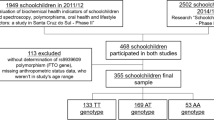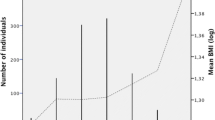Abstract
The fat mass and obesity-associated gene (FTO) has been extensively reported in the literature related to nutritional status, but there has been limited description of the genetic contribution to obesity risk during childhood and adolescence, especially in Latin Americans. This study aims to associate the rs9939609 polymorphism, of the FTO gene, with changes in nutritional status in Brazilian schoolchildren followed for 3 years. A longitudinal study was conducted with 355 schoolchildren, aged 7–15 years in 2011/2012 and subsequently re-evaluated in 2014/2015. Nutritional (obesity) status was classified by identifying those exceeding recommended thresholds for waist circumference (WC), waist-to-height ratio (WHtR), body mass index (BMI), and body fat percentage (BF%). The rs9939609 polymorphism was genotyped by a real-time polymerase chain reaction. Relative risk (RR with 95% confidence interval) of obesity status by FTO gene polymorphism was calculated by Poisson regression. The risk group was determined for genotypes with the allele A polymorphism, and regression models were adjusted for age, sex, height, ethnicity, and geographical location. Considering the longitudinal changes in status over the 3-year follow-up, the RR of developing a WC exceeding the threshold recommended (WC >75th age and sex-standardized percentile), or remaining with this condition, was higher in children with AT/AA genotype. For WC, the RR was 1.66 (1.07; 2.58) in crude analysis and 1.17 (1.01; 1.35) following adjustment for age (years), gender, ethnicity, and geographical location. The comparative risk of abdominal obesity, assessed by WHtR (not recommended threshold ≥0.50), was 53% and 8%, respectively, higher in AT/AA compared to TT genotype.
Conclusion: This is one of the first longitudinal investigations to show a significant association between the A allele of the rs9939609 polymorphism and individuals with higher than recommended WC and WHtR measures in Brazilian children and adolescents.
What is known: • The FTO has an effect on increases in body mass index (BMI) among children and adolescents. • It established the association between FTO and overweight/obesity in Caucasians. | |
What is new: • The presence of the risk allele of rs9939609 (FTO gene) polymorphism is associated with increased abdominal fat in Brazilian schoolchildren. • Was detected an association between FTO gene polymorphism (rs9939609) with WC in follow-up cohort and changes in WC and WHtR follow-up over 3 years, during childhood and adolescence growth. |



Similar content being viewed by others
Data availability
The database used and analyzed in the present study is not publicly available as its information may compromise the participants’ privacy and consent involved in the research. However, the data are available from the corresponding author (EA), upon request.
Abbreviations
- BF%:
-
Body fat percentage
- BMI:
-
Body mass index
- CI:
-
Confidence interval
- FTO gene:
-
rs9939609 polymorphism
- FTO:
-
Fat mass and obesity-associated gene
- MAF:
-
Minor allele frequency
- PCR:
-
Polymerase chain reaction
- RR:
-
Relative risk
- SNPs:
-
Single nucleotide polymorphisms
- W:
-
Waist circumference
- WHtR:
-
Waist-to-height ratio
References
Ang YN, Wee BS, Poh BK, Ismail MN (2013) Multifactorial influences of childhood obesity. Curr Obes Rep 2:10–22. https://doi.org/10.1007/s13679-012-0042-7
Shabana HS (2015) Effect of the common fat mass and obesity associated gene variants on obesity in Pakistani population: a case-control study. Biomed Res Int 2015:852920–852928. https://doi.org/10.1155/2015/852920
Liu C, Mou S, Cai Y (2013) FTO gene variant and risk of overweight and obesity among children and adolescents: a systematic review and meta-analysis. PLoS One 8:e82133. https://doi.org/10.1371/journal.pone.0082133
Quan LL, Wang H, Tian Y, Mu X, Zhang Y, Tao K (2015) Association of fat-mass and obesity-associated gene FTO rs9939609 polymorphism with the risk of obesity among children and adolescents: a meta-analysis. Eur Rev Med Pharmacol Sci 19:614–623
Zhao N, Dong G, Wu W et al (2019) FTO gene polymorphisms and obesity risk in Chinese population: a meta-analysis. World J Pediatr 15:382–389. https://doi.org/10.1007/s12519-019-00254-2
Reuter CP, Burgos MS, Bernhard JC, Tornquist D, Klinger EI, Borges TS, Renner JDP, de Moura Valim AR, de Mello ED (2016) Association between overweight and obesity in schoolchildren with rs9939609 polymorphism (FTO) and family history for obesity. J Pediatr 92:493–498. https://doi.org/10.1016/j.jpedp.2016.05.003
Pereira P de A, Alvim-Soares AM, Sandrim VC, et al (2016) Lack of association between genetic polymorphism of FTO, AKT1 and AKTIP in childhood overweight and obesity. J Pediatr 92:521–527. https://doi.org/10.1016/j.jpedp.2016.07.002
Silva CF, Zandoná MR, Vitolo MR et al (2013) Association between a frequent variant of the FTO gene and anthropometric phenotypes in Brazilian children. BMC Med Genet 14:1–8. https://doi.org/10.1186/1471-2350-14-34
Lourenço BH, Qi L, Willett WC et al (2014) FTO genotype, vitamin D status, and weight gain during childhood. Diabetes 63:808–814. https://doi.org/10.2337/db13-1290
Zhang M, Zhao X, Cheng H, Wang L, Xi B, Shen Y, Hou D, Mi J (2014) Age- and sex-dependent association between FTO rs9939609 and obesity-related traits in Chinese children and adolescents. PLoS One 9:e97545. https://doi.org/10.1371/journal.pone.0097545
Abadi A, Peralta-Romero J, Suarez F, Gomez-Zamudio J, Burguete-Garcia AI, Cruz M, Meyre D (2016) Assessing the effects of 35 European-derived BMI-associated SNPs in Mexican children. Obesity (Silver Spring) 24:1989–1995
Alves-Silva J, da Silva Santos M, Guimarães PEM et al (2000) The ancestry of Brazilian mtDNA lineages. Am J Hum Genet 67:444–461. https://doi.org/10.1086/303004
Taylor R, Jones I, Williams S, Goulding A (2000) Evaluation of waist circumference, waist-to-hip ratio, and the conicity index as screening tools for high trunk fat mass, as measured by dual-energy X-ray. Am J Clin Nutr 72:490–495
Fernández JR, Redden DT, Pietrobelli A, Allison DB (2004) Waist circumference percentiles in nationally representative samples of African-American, European-American, and Mexican-American children and adolescents. J Pediatr 145:439–444. https://doi.org/10.1016/j.jpeds.2004.06.044
Khoury M, Manlhiot C, McCrindle BW (2013) Role of the waist/height ratio in the cardiometabolic risk assessment of children classified by body mass index. J Am Coll Cardiol 62:742–751. https://doi.org/10.1016/j.jacc.2013.01.026
World Health Organization (2007) BMI-for-age (5-19 years). http://www.who.int/growthref/who2007_bmi_for_age/en/. Accessed 9 Jul 2018
Slaughter AMH, Lohman TG, Boileau RA et al (2013) Skinfold equations for estimation of body fatness in children and youth. Hum Biol 60:709–723
Lohman TG (1987) The use of skinfold to estimate body fatness on children and youth. J Phys Educ Recreat Danc 58:98–103. https://doi.org/10.1080/07303084.1987.10604383
Instituto Brasileiro de Geografia e Estatística Indicadores Sociais Mínimos: conceitos. https://ww2.ibge.gov.br/home/estatistica/populacao/condicaodevida/indicadoresminimos/conceitos.shtm. Accessed 31 May 2020
World Health Organization (2017) Facts and figures on childhood obesity. http://www.who.int/end-childhood-obesity/facts/en/. Accessed 30 Sep 2018
Styne DM, Arslanian SA, Connor EL, Farooqi IS, Murad MH, Silverstein JH, Yanovski JA (2017) Pediatric obesity-assessment, treatment, and prevention: an endocrine society clinical practice guideline. J Clin Endocrinol Metab 102:709–757. https://doi.org/10.1210/jc.2016-2573
Yang M, Xu Y, Liang L, Fu J, Xiong F, Liu G, Gong C, Luo F, Chen S, Xu C, Zhang D, Li Z, Zhang S, Zhang Y, Wang H, Zhu Y (2014) The effects of genetic variation in FTO rs9939609 on obesity and dietary preferences in Chinese Han children and adolescents. PLoS One 9:e104574. https://doi.org/10.1371/journal.pone.0104574
World Health Organization (2017) Facts and figures on childhood obesity. http://www.who.int/end-childhood-obesity/facts/en/. Accessed 12 Jul 2018
Lee SJ, Bacha F, Arslanian SA (2006) Waist circumference, blood pressure, and lipid components of the metabolic syndrome. J Pediatr 149:809–816. https://doi.org/10.1016/j.jpeds.2006.08.075
Obregón Rivas AM, Santos JL, Valladares MA, Cameron J, Goldfield G (2018) Association of the FTO fat mass and obesity–associated gene rs9939609 polymorphism with rewarding value of food and eating behavior in Chilean children. Nutrition 54:105–110. https://doi.org/10.1016/j.nut.2018.03.001
da Fonseca ACP, Abreu GM, Zembrzuski VM, Campos Junior M, Carneiro JRI, Nogueira Neto JF, Cabello GMK, Cabello PH (2019) The association of the fat mass and obesity-associated gene (FTO) rs9939609 polymorphism and the severe obesity in a Brazilian population. Diabetes, Metab Syndr Obes Targets Ther 12:667–684. https://doi.org/10.2147/DMSO.S199542
Peng S, Zhu Y, Xu F, Ren X, Li X, Lai M (2011) FTO gene polymorphisms and obesity risk: A meta-analysis. BMC Med 9:71. https://doi.org/10.1186/1741-7015-9-71
Frayling TM, Timpson NJ, Weedon MN, Zeggini E, Freathy RM, Lindgren CM, Perry JRB, Elliott KS, Lango H, Rayner NW, Shields B, Harries LW, Barrett JC, Ellard S, Groves CJ, Knight B, Patch AM, Ness AR, Ebrahim S, Lawlor DA, Ring SM, Ben-Shlomo Y, Jarvelin MR, Sovio U, Bennett AJ, Melzer D, Ferrucci L, Loos RJF, Barroso I, Wareham NJ, Karpe F, Owen KR, Cardon LR, Walker M, Hitman GA, Palmer CNA, Doney ASF, Morris AD, Smith GD, The Wellcome Trust Case Control Consortium, Hattersley AT, McCarthy MI (2007) A common variant in the FTO gene is associated with body mass index and predisposes to childhood and adult obesity. Science 316(80):889–894. https://doi.org/10.1126/science.1141634
Ortega FB, Cadenas-Sanchez C, Migueles JH, Labayen I, Ruiz JR, Sui X, Blair SN, Martínez-Vizcaino V, Lavie CJ (2018) Role of physical activity and fitness in the characterization and prognosis of the metabolically healthy obesity phenotype: a systematic review and meta-analysis. Prog Cardiovasc Dis 61:190–205. https://doi.org/10.1016/J.PCAD.2018.07.008
Qi Q, Downer MK, Kilpelainen TO et al (2015) Dietary intake, FTO genetic variants, and adiposity: a combined analysis of over 16,000 children and adolescents. Diabetes 64:2467–2476. https://doi.org/10.2337/db14-1629
Bordoni L, Marchegiani F, Piangerelli M, Napolioni V, Gabbianelli R (2017) Obesity-related genetic polymorphisms and adiposity indices in a young Italian population. IUBMB Life 69:98–105
Acknowledgements
The authors acknowledged Miria Suzana Burgos (in memoriam) for having entrusted the use of data collected in previous research, under her coordination.
Funding
This research was supported by the Brazilian Agencies Foundation for Research Support of Rio Grande do Sul (FAPERGS), the National Council of Technological and Scientific Development (CNPq), and the Coordination of Improvement of Higher Level Personnel (CAPES). This study was financed in part by CAPES - Finance Code 001.
Author information
Authors and Affiliations
Contributions
EMR, CPR, and EDM participated in all phases, conceptualized the study, and carried out the analysis and interpretation. SC, JPH, and JFCS contributed to analysis and interpretation of study findings. PFT and ARMV participated in the study design and carried out the technical aspects of the experiments. All authors revised the manuscript and approved the final version.
Corresponding author
Ethics declarations
Ethical approval
The research was approved by the Committee of Ethics in Research with Human Beings of the University of Santa Cruz do Sul, protocol number 1.836.983, and the procedures followed were in accordance with the Helsinki Declaration.
Consent to participate
All the subjects whose parents or guardians signed the free and informed consent form were included in the study. Likewise, the subjects’ right to privacy and confidentiality was guaranteed, with no information identifying the subjects in text or images.
Consent for publication
N/A
Competing interests
The authors declare no competing interests. JFCS received research grants by CAPES as a master’s student. The other authors have no financial relationship with the organizations that sponsored the research.
Additional information
Communicated by Peter de Winter
Publisher’s note
Springer Nature remains neutral with regard to jurisdictional claims in published maps and institutional affiliations.
Rights and permissions
About this article
Cite this article
Reuter, É.M., Reuter, C.P., de Castro Silveira, J.F. et al. FTO gene polymorphism and longitudinal changes in nutritional/obesity status in children and adolescents: Schoolchildren’s health cohort study. Eur J Pediatr 180, 3325–3333 (2021). https://doi.org/10.1007/s00431-021-04120-0
Received:
Revised:
Accepted:
Published:
Issue Date:
DOI: https://doi.org/10.1007/s00431-021-04120-0




